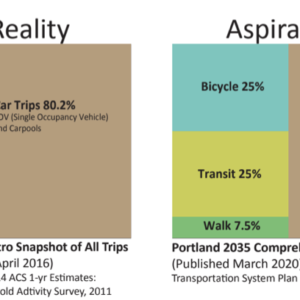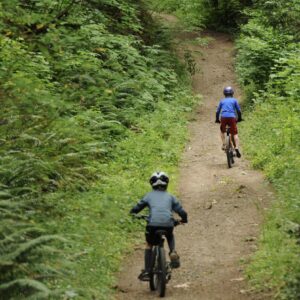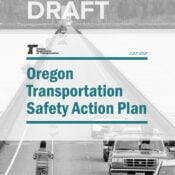As a follow-up to our story yesterday about how some local trail advocates are concerned that the proposed Portland Bicycle Plan for 2030 does not go far enough in support of off-street paths, below is the full text of formal comments that will be submitted by the nine-member, ad-hoc Sullivans Gulch Trail Committee
Comments on the Draft Portland Bicycle Master Plan
October 26, 2009Thank you for the opportunity to provide these comments on the Bicycle Master Plan. As users, supporters and benefactors of our cycling facilities it is a pleasure to be able to help build on so many successes. We are writing to encourage more resources be dedicated to off-street infrastructure including the development of pathways around the City and region. We envision a network of pathways that moves beyond the shared on-street facilities and traditional multi-use pathways. A network that provides a truly exceptional level of service for cyclists that would equate to bicycle expressways –safe and uninterrupted corridors that encourage new cyclists and their families.
The past decade has indeed seen great improvements in the openness and support for cyclists in the City of Portland. As research has indicated ridership has increased to levels envied across the nation, and now more and increasingly diverse riders take to the road each day as a part of their commute and daily trips. The City’s efforts have included innovative tools and designs to better integrate cyclists into the existing transportation network.
Today we have the opportunity to craft a new vision for cycling in Portland. A vision that embraces the desire to move more citizens by bike in order to improve our environment, to improve our quality of life and to embrace the unique culture of Portland. The next steps in building our cycling future cannot be incremental; we must break away from traditional ideas of infrastructure design. These steps will need to be taken to get at the “interested but concerned” among us. Research by Professor Jennifer Dill at Portland State University and many others has demonstrated that a lack on off-street facilities is a barrier to gains in ridership, especially for women cyclists. This research indicates that in New York City, on-street ridership is predominantly men, but that off-street paths demonstrate an almost equal proportion of men and women. The city must expand its focus on off-street and non-motorized routes through aggressive expansion of pathways. A vision for 2030 will need to embrace many new firsts for Portland, and for the nation.
We recognize that this is a transportation planning document, and traditionally pathways are included as a supplement to motorized facilities in the planning process. Most of the improvements identified are dependent on an existing motorized facility. We are concerned about the decision to remove “Off-street paths” as a separate classification for facilities introduces challenges to capturing this distinction. By removing off-street paths as a classification, we worry that this type of facility will be lost as an option in future transportation planning. We believe that separate, non-motorized facilities including pathways, provide exceptional benefits that cannot be replicated through shared motorized on-street facilities. Other language in the plan also suggests off-street facilities are not a high priority. In the introduction to the plan it is stated that the plan “includes recommendations for future bicycle facilities on many miles of Portland streets,” leaving one to ask if pathways will be included at all? The plan also treats off-street paths as connections where on-street options do not exist. We believe this is not the way to think about off-street paths. Off-street paths should be a priority for the benefits they provide, not as routes of last resort. It hobbles our city’s cycling future to limit the development of new cycling facilities to the motorized network.
While funding is a challenge for the future of all transportation modes, if we plan only based on the resources we think we’ll have and not the needs and vision of the City, we are destined to never move beyond what we have today. Instead we need a plan that captures our vision as a great cycling City, and then address the funding challenges to move forward. For this reason we believe that if only Tier One projects are accomplished from this plan, nothing is truly gained. Tier One represents the status quo. Tier Two starts to show the ambition we need to achieve our vision. Dedicated, off-street cycling facilities will be essential to the future and our vision for 2030.
Based on our concerns and our vision for cycling in the city we recommend the following:
- Recognize in policy that trails are transportation facilities.
- Include a policy recognizing that trails provide the highest level of safety and comfort for cyclists and are the platinum standard for transportation.
- Maintain a classification for off-street facilities recognizing the uniqueness of these facilities and the benefits they provide.
- Include off-street pathways in the “low-stress bikeways” definition.
- Make the development of non-motorized routes a priority in the city, both on new and existing corridors.
- Develop designs and goals to develop trails as 24-hour facilities with lighting, safety and design similar to the considerations given to motorized streets.
- Develop and dedicate a portion of transportation funding to the study, planning and development of off-street facilities in the next five years.
- Increase and develop funding sources for our cycling infrastructure.
- Develop iconic, defining and enduring facilities that show Portland’s commitment and vision.
- Continue the support and progress towards developing the Sullivans Gulch Trail, North Portland Greenway, Fanno Creek Trail and the Red Electric Trail.
Further, we encourage partnerships to be formed between the Bureaus of Transportation, Parks and Recreation and others to identify and develop dedicated pathways for cyclists. We are concerned that each Bureau adopts its own separate plan but that proper and full integration does not occur. Regional integration is also critical. As Metro develops its network of trails all jurisdictions must cooperate to create standards for mobility, way finding and safety. We further encourage funding for planning and capital projects be targeted at pathways such as the Sullivans Gulch Trail, the North Portland Greenway, the Fanno Creek Trail and the Red Electric Trail to create a backbone for future cycling growth. It is only with dedicated non-motorized facilities that we can truly break into a new future for cycling in Portland and the nation.
Investing in trails today will recognize and affirm the need for dedicated routes for non-motorized travel. By 2030, our city, region and nation may have very different mobility needs as the cost of fuel changes and as concerns over climate change are addressed in law and policy. It may come to pass that existing motorized routes will no longer have cars to travel on them as they do today, and non-motorized designs will be critical to this transition. Pathways today provide the foundation for a better cycling community in 2030.
Sincerely,Paul Manson
Sullivans Gulch Trail Committee
info@sullivansgulchtrail.org
http://www.sullivansgulchtrail.orgAbout the Committee
The committee is an all-volunteer group drawing from the adjacent neighborhoods and workplaces along the proposed corridor. Since 2003 the group has actively called for the construction of the trail. The committee has developed support for the trail from all neighborhood associations along the route.Sullivans Gulch Trail Committee
Lynne Coward
Ted Gilbert
Ted Grund
Dan Lerch-Walters
Robert Jordan
Paul Manson
Susan Marxer-Hathaway
Brad Perkins
Linda Robinson




